Long ago, in a time shrouded by the mists of antiquity, the mighty god Poseidon ruled the seas, his trident a symbol of both authority and destruction. As protector of the seafaring Greeks, Poseidon was revered and feared, his temperament as volatile as the tempests he could summon with a mere flick of his wrist. Yet, there was a time when the god of the sea turned his wrath upon the very people who worshipped him, threatening to drown the entire realm of Greece in a cataclysmic flood. This is the tale of how Poseidon's fury was unleashed, and how the actions of the gods and mortals alike forever altered the course of history.
It began with a sacred prophecy, whispered by the Oracle at Delphi. A great calamity would befall Greece if the gods were not appeased, the Oracle foretold. Word of this dire omen spread like wildfire, reaching the farthest corners of the land. Fearing for their lives, the Greeks sought counsel from the pantheon, imploring them for guidance and mercy.
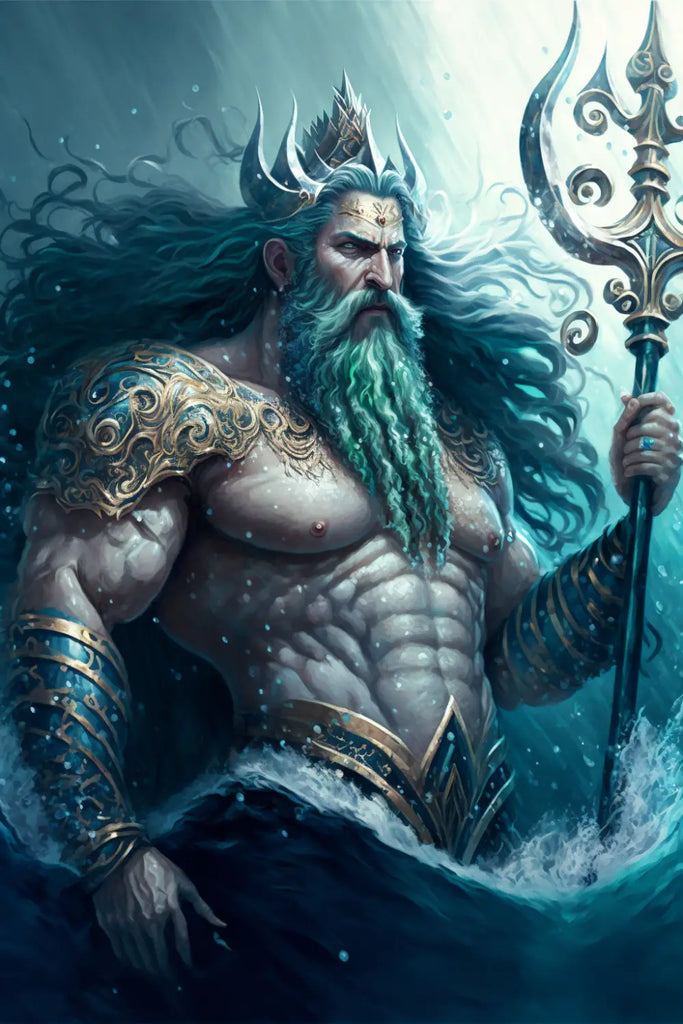
Hearing the desperate pleas of his worshippers, Poseidon's heart softened. He devised a plan to save Greece from the impending doom foretold by the Oracle: a grand temple, dedicated to the gods, built by the combined efforts of mortals and divine beings. This temple would symbolize the unity between gods and humans, a bond strong enough to withstand the forces of fate.
Zeus, king of the gods, agreed to Poseidon's plan and commanded the other deities to lend their aid. Among them was the enigmatic Anubis, the Egyptian god of the dead. Though Anubis did not belong to the Greek pantheon, he was intrigued by the plight of the Greeks and sought to test their devotion to their gods.
As construction of the temple began, Anubis approached Poseidon with a proposition. The god of the dead offered his assistance in the form of a powerful artifact: the Amulet of the Depths, capable of controlling the very waters Poseidon ruled. In exchange, Anubis asked for a single favor: to be granted dominion over the souls of the Greeks who perished at sea, a realm that had long been contested between the two gods.
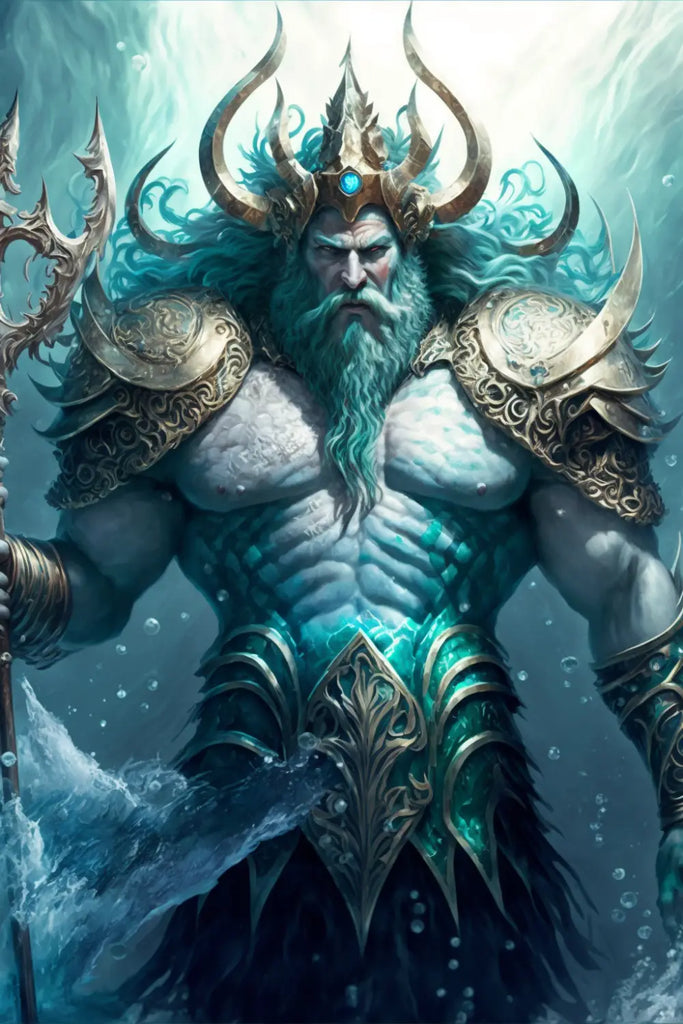
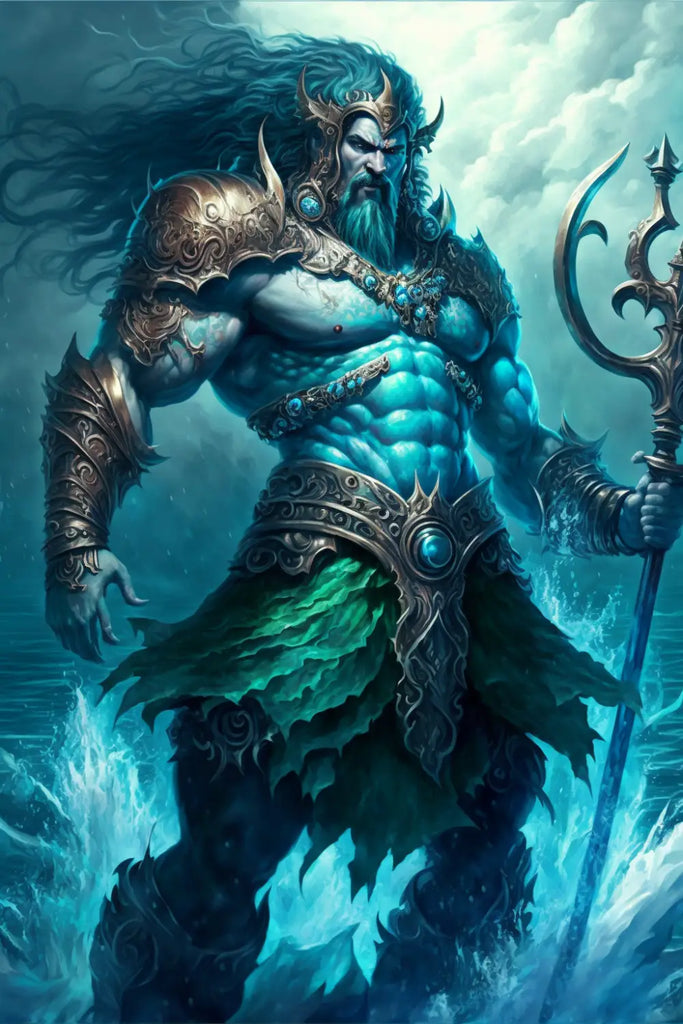
Poseidon, wary of Anubis' intentions but swayed by the potential power of the amulet, agreed to the deal. Little did he know that Anubis had hidden motives, seeking not only to claim the souls of the drowned but also to undermine the authority of the Greek gods themselves.
As the temple neared completion, Anubis revealed his treachery. With a sly grin, he placed the Amulet of the Depths around Poseidon's neck, imbuing him with its incredible power. Yet, the amulet was cursed, corrupting the god's mind and filling him with an uncontrollable rage. In his fury, Poseidon struck the temple with his trident, shattering the monument and scattering its pieces across the realm.
The consequences were catastrophic. The once-calm seas turned violent and tempestuous, waves crashing against the shores and flooding the lands of Greece. Poseidon, his mind clouded by the curse, vowed to drown the entire realm and all who dwelled within it. As the waters rose, the people of Greece cried out for help, but their prayers seemed to fall on deaf ears.
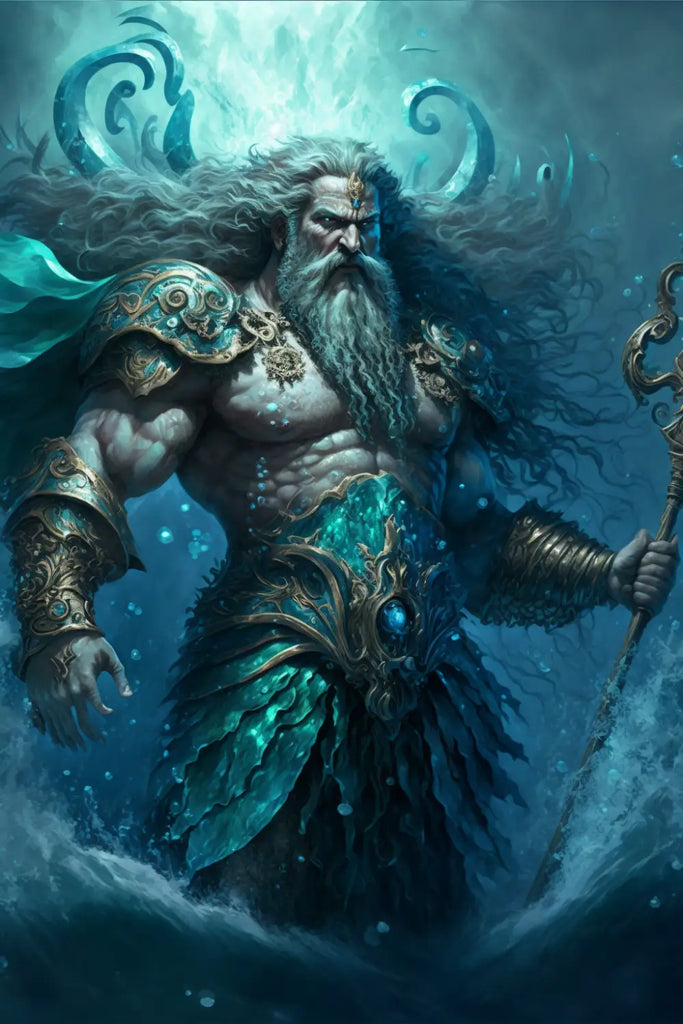
Yet not all hope was lost. The hero Perseus, son of Zeus, heard the pleas of the Greeks and set out to confront Poseidon. Armed with the legendary Sword of Helios, Perseus embarked on a treacherous journey to reach the heart of the storm and face the wrathful god.
In the midst of the raging tempest, the hero encountered the terrifying sea serpent, Cetus, sent by Poseidon himself to guard the path. A fierce battle ensued, as Perseus fought to overcome the monstrous beast. Summoning all his strength and skill, the hero struck the serpent down, clearing the way to confront Poseidon.
As the storm reached its peak, Perseus found Poseidon standing atop a mountain, his trident raised to unleash further destruction upon the world. The hero implored the god to spare Greece, reminding him of the bond that had once united them. Poseidon, consumed by the curse, refused to listen and attacked Perseus in a blind rage.
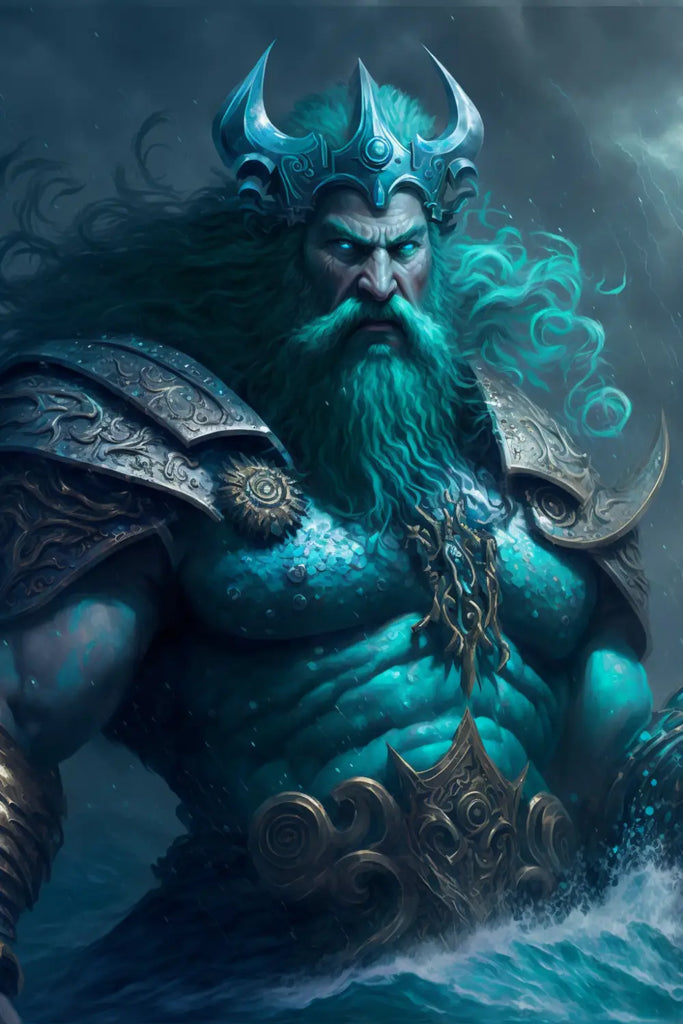
ios, Perseus embarked on a treacherous journey to reach the heart of the storm and face the wrathful god.
In the midst of the raging tempest, the hero encountered the terrifying sea serpent, Cetus, sent by Poseidon himself to guard the path. A fierce battle ensued, as Perseus fought to overcome the monstrous beast. Summoning all his strength and skill, the hero struck the serpent down, clearing the way to confront Poseidon.
As the storm reached its peak, Perseus found Poseidon standing atop a mountain, his trident raised to unleash further destruction upon the world. The hero implored the god to spare Greece, reminding him of the bond that had once united them. Poseidon, consumed by the curse, refused to listen and attacked Perseus in a blind rage.
The battle between god and hero raged on, the very elements themselves bending to the will of the combatants. Perseus fought with the courage and determination of a true hero, dodging the god's devastating blows and striking back with the divine Sword of Helios.
As the conflict intensified, the other gods watched from their celestial abodes, torn between their allegiance to Poseidon and their duty to protect the people of Greece. Anubis, observing the events from afar, reveled in the chaos he had wrought, confident that his plan to undermine the Greek gods was nearing fruition.
However, Anubis had underestimated the bonds between the gods and their mortal followers. Athena, the goddess of wisdom and war, intervened on Perseus' behalf, revealing the truth about the cursed amulet that controlled Poseidon. Galvanized by this knowledge, the gods united against Anubis, seeking to restore balance to the world.
Meanwhile, Perseus continued his desperate struggle against the enraged Poseidon. As the battle wore on, the hero grew weary, his strength waning. In a final, desperate attempt to save Greece, Perseus lunged at Poseidon, plunging the Sword of Helios into the cursed amulet.
The resulting explosion of divine energy shattered the Amulet of the Depths, freeing Poseidon from its malevolent influence. The god's rage dissipated, replaced by sorrow and shame at the destruction he had wrought upon the land he had once vowed to protect.
With Poseidon freed from the curse, the gods turned their attention to Anubis. The Egyptian god of the dead, realizing that his schemes had been thwarted, fled to the underworld to escape the wrath of the Greek pantheon. His treachery exposed, Anubis was forever banished from the realm of the Greek gods, his dark ambitions never to be realized.
In the wake of the great flood, Poseidon sought to atone for his actions. With the aid of the other gods, the deity of the sea worked tirelessly to restore Greece to its former glory. The temple that had once symbolized the unity between gods and mortals was rebuilt, its magnificent architecture a testament to the resilience and perseverance of the Greek people.
And so, the epic tale of betrayal, redemption, and divine wrath came to an end. The people of Greece, grateful for the deliverance from their watery doom, continued to honor Poseidon and the other gods, their faith renewed by the trials they had faced. The Raging Wrath of Poseidon became a legend passed down through the ages, a cautionary tale of the dangers of hubris and the enduring bond between gods and mortals.
















